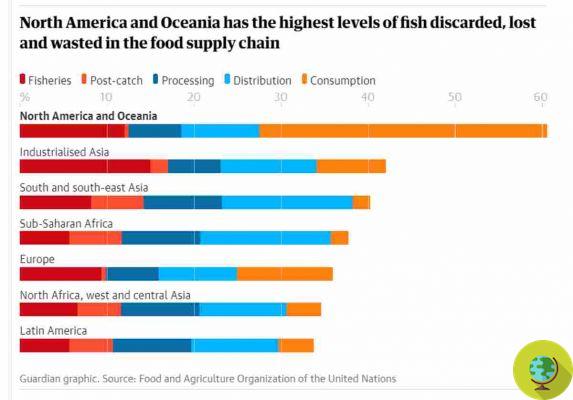Dumped at sea, lost on land or left to rot in shops and refrigerators, global fish is being wasted like never before, damaging not just the oceans but the food of billions of people. According to the WWF, 92% of the fishing discards recorded in the European Union come from "trawling". What can be done to reverse the trend?
He is about to end up run over, his mother saves him
It was only last February when a Dutch-owned fishing boat released a huge amount of blue whiting, a cod subspecies, into the sea, creating a floating carpet of carcasses. The owners of the ship spoke of a faulty net, while environmental groups later claimed that the fish had been intentionally dumped.
Where is the truth? Where does reality lie in the midst of this endless, illegal and unsustainable fishing in our seas? Something - in the face of such high numbers - must be lost and wasted.
According to the WWF, 31% of global fish stocks are exploited above the sustainability level and 61% exploited at full capacity. The conditions of global fish stocks are made even more severe by unsustainable fishing practices, which inevitably lead to habitat destruction and the accidental capture of threatened and target species (the species of greatest commercial interest).
Do you really know what lies behind a can of tuna? The UN alarm that should make you think
Illegal fishing is a rampant threat to the world's fish stocks and the communities that depend on them. Every year, around the world, between 11 and 26 tons of fish are illegally caught with total annual losses between 10 and 23,5 billion dollars.
The numbers
In addition, according to WWF data, in 2019 at least well 230 tons of fish were discharged into European waters. Most of the waste, the 92%, is related to trawling, a fishing method that scrapes literally the bottom of the sea, indiscriminately collecting everything it encounters.
But this is only a very small figure of an even bigger global problem. FAO estimates that 35% of all fish, crustaceans and molluscs collected from oceans, lakes and fish farms go wasted o lost before reaching our tables. Fish are in fact highly perishable and fragile, which makes them even more vulnerable. In addition, fish populations are already largely threatened not only by overfishing, but also by pollution and the climate crisis.

©The Guardian
Add to this the fact that just under half of all fish consumed by people is caught offshore:
34% of global marine stocks are now overexploited, Pete Pearson, WWF's senior director for food waste, told The Guardian. By-catches (unwanted fish caught unintentionally) are also a growing problem: around 10% of fish caught in the wild are discarded every year worldwide, equivalent to 8,6 million tonnes of animals. The main culprits are inaccurate fishing gear and policies that allow fishermen to discard non-target species.
Is there a precise economic plan behind all this?
Of course yes.
Although grants have historically been designed to support small-scale fishermen, today 80% of the $ 35,4 billion subsidies annual fishing goes to a handful of industrial fleets. These include giant trawlers that are only equipped to travel the high seas and overfishing, leading to industrial-scale discards.
The impact of illegal and undeclared fishing is also important, as it likely contributes tons of by-catches to global fish waste.
Food for 3 billion people
Wasting fish is more than just the physical loss of fish - for the 3 billion people whose diets depend on fish, it is a lost nutritional opportunity.
The narrative is that we need to produce more to feed the growing masses, but the best way to [increase] supply would be to reduce losses and waste, '' says Shakuntala Thilsted, global leader in nutrition and public health at World Fish. and winner of the 2021 World Food Award.
Fish waste continues after collection, although how it develops varies by location. FAO estimates that 27% of all fish in the world are lost or wasted after landing, but in low-income countries fish are more likely to be lost unintentionally.
According to a study, in fact, in countries such as Ghana, Burkina Faso and Togo, 65% of the fish lost ashore was attributable to poor handling, the lack of storage and cooling facilities on fishing vessels and losses along the long supply chain. All this in the face of the fact that in North America, Oceania and Europe, the fish waste consumed far exceeds that of any other region of the world.
Pearson believes retailers in the United States are contributing in part to the problem by prioritizing fresh, large fish to sell and when retailers prioritizing fresh fish, “the knock-on effect is that consumers are more likely to waste it in their homes “.
What if we freeze the fish?
Indeed, there are solutions to reduce spoilage of fish along the supply chain. Increased access to cold chain technologies in low-income countries, along with methods such as solar-powered drying curtains, could extend the shelf life of fish.
Just as fishermen and processors would also need training on better handling and storage of fish to limit losses and fishermen should be equipped with more selective fishing gear.
Ultimately - Pearson concludes - we should encourage more people to opt for frozen fish, which could reduce the demand for fresh fish in grocery stores and limit the amount that is lost in people's stores and homes.
For generations we have believed that the ocean is huge and that we can simply take whatever we want from it. It is not so. It never was.
Follow your Telegram | Instagram | Facebook | TikTok | Youtube
Fonti: WWF / FAO / The Guardian
Read also:
- Illegal and bottom trawling: shocking data reveal how we are emptying the Mediterranean
- Do you know what's behind octopus fishing? The investigation that lifted the veil on this cruel practice


























